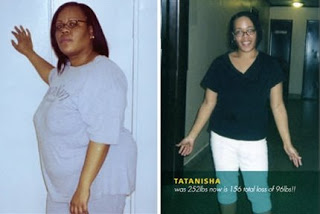Lose Weight > Weight Loss Tips > About Tips > Several Very Good Reasons Why Diets Do Not Work The Way They Are Supposed To
Several Very Good Reasons Why Diets Do Not Work The Way They Are Supposed To
The most common reason diets don't work is that people go on very restrictive diets in an effort to lose weight, and then can't stick with them. Either they become discouraged rapidly, and stop the diet before they achieve weight loss, or the achieve the weight loss and then stop dieting, and the pounds pile back on. Both ways end in disappointment.
The problem is that people on diets are eating unnaturally for themselves. They force themselves into eating patterns that they find very difficult to tolerate, and either stick with them through sheer willpower, or fail. Most of us don't have the willpower required to turn down dessert for the rest of our lives.
Extremely restrictive diets are hard to stick with for various reasons. One is that people on strict diets find it very hard to go to social events where there is food, which is most of them. And people who slip on their diets often feel depressed out of proportion to the slip, and that depression can lead to giving up altogether.
A considerable problem with dieting is the calorie restriction. Yes, calorie restriction is necessary to lose weight, but restricting calories too much slows the metabolism, which then needs fewer calories. This means dieters are eating less but not losing weight, which is a very frustrating situation to be in.
When people diet but do not exercise, they lose water, muscle and fat in approximately equal measures, and the water weight comes back almost instantly after the diet ends. Muscle is where most calories are burned, so losing muscle actually reduces the amount of calories a dieter's body needs. When the diet ends, the weight comes right back on, but this time, it's mostly fat instead of the half muscle-half fat that was lost.
There are more reasons than are laid out here, but these are all good reasons why diets do not work. Dieting, judged by scientific studies on the subject, actually appears to be detrimental to people's health. But losing weight, and keeping it off, is good for you. So, there must be some other way to lose weight than through a diet.
A lot of people who haven't, and most people who have been on a diet, know about the caloric balance. People must take in less calories than they burn in order to lose weight. But people making extreme changes in their diets rarely stick with them. So, these changes must be made very slowly, if they are intended to be made permanent.
Small changes made one at a time give people the best chance for success. A change might be reducing sugar intake by half or walking three days a week. This is the only change you would make for at least two weeks, maybe a month, in order to let yourself get used to it. Then, another small change would be added. In this way, hopefully, the changes become normal and a permanent part of the way you eat, rather than a transient diet. It can be tedious, but it can work.
Related Articles
-
Diet Chart For Control Obesity
Excessive weight loss is a question for those who do not know the app
-
The Key To Controlling Insulin Levels And Looking Great In Your Mini Skirt
Insulin level is controlled and manipulated by the glycemic load of f
-
Top Natural Weight Loss Tips For Women
You all have a healthy body and mind, and that is to receive a decisi
-
3 Things Your Birth Predicts About Your Health
You eat right, exercise, and try not to sweat the small stuff. You sho
-
Weight Loss Diets: Essential Tips
Losing weight is a challenge that very many people battle with on a d
-
Tips For Losing Your Extra Weight The Right Way
One common resolution Americans make when the New Year comes is t
- DON'T MISS
- 4 Ways Skimping On Even Just A Little Bit Of Sleep Can Make You Gain Weight
- This Before And After Pic Is A Total Lie...For A Good Reason
- After Pregnancy Weight Loss
- Natural Fat Burning Foods - Lose Weight More Effectively
- Fight Emotional Attitude For An Effective Weight Loss
- Take It Off And Keep It Off – Weight Loss Tips You Need
- Exercise To Boost Your Metabolism And Increase Weight Loss
- How to Follow the General Motors Diet
- Lose Weight Before Getting Out Of Bed With These Yoga Moves!
- Best Tips To Lose Weight Fast With Natural Herbal Remedies
More Great Links




